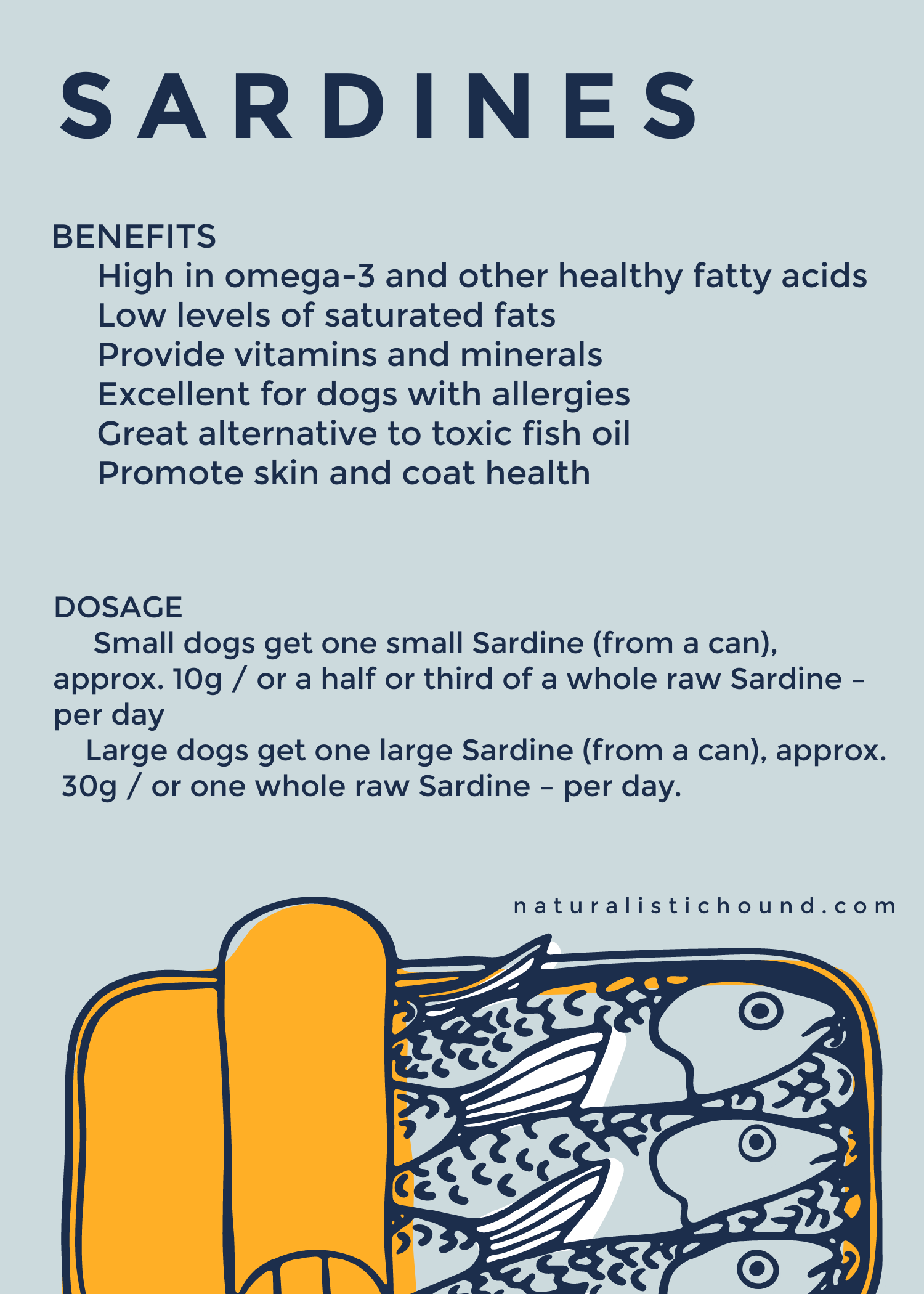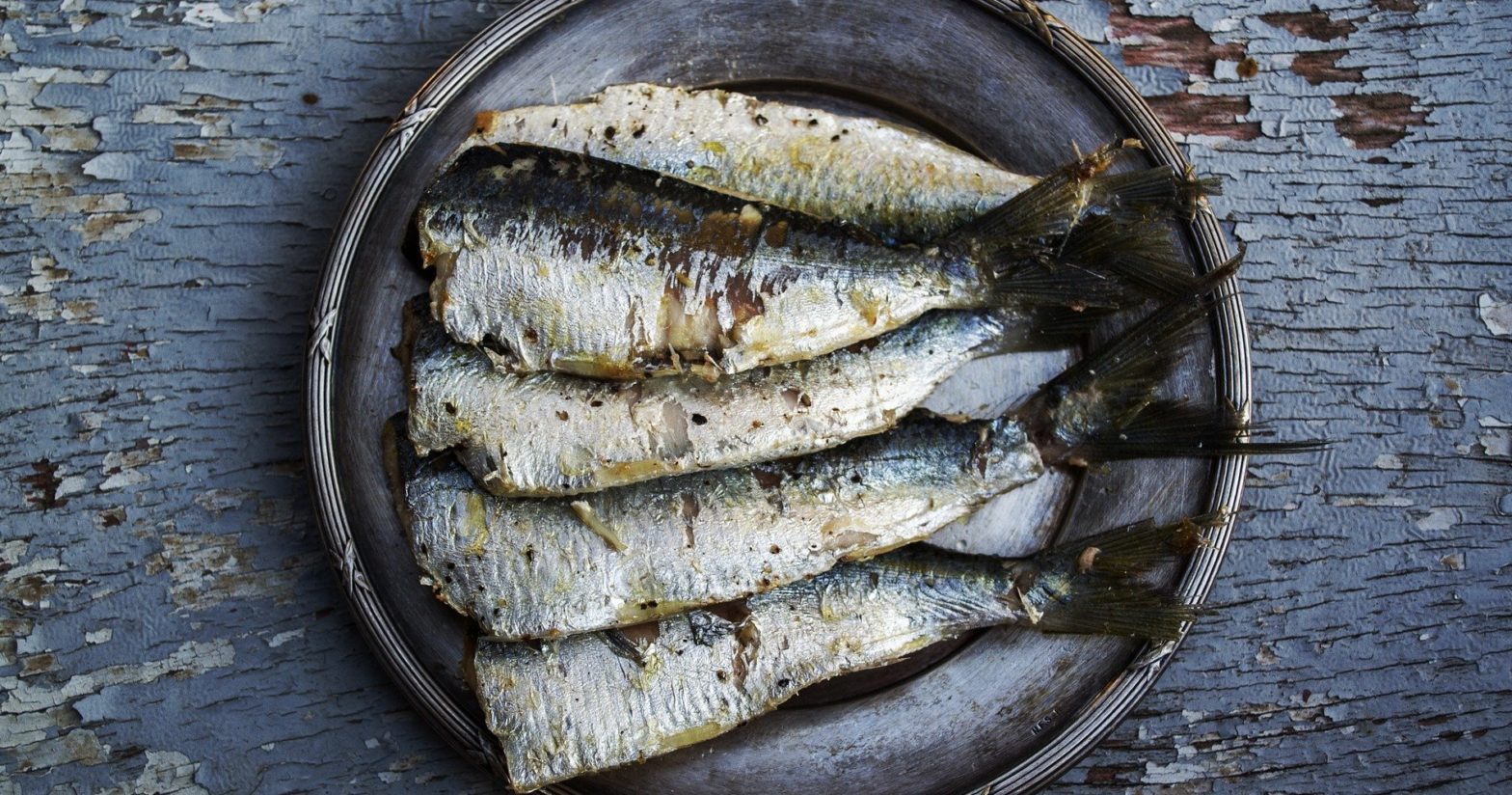Pepper loves his stinky Sardines! And I am glad he enjoys this super nutritious food… Let’s see in more detail what we are talking about:
Benefits of Sardines for Dogs
Some of the main benefits of feeding Sardines to your dog are:
- High in omega-3 and other healthy fatty acids
Sardines are high in various fatty acids that are essential for good health, particularly omega-3 fatty acids. Unlike other fatty acids that can be produced naturally in the body, omega-3 can only be consumed as part of your dog’s diet. Omega-3 fatty acids are extremely important as they support brain development (making them great for growing puppies and senior dogs too) and are essential for eye health.
Furthermore, they can also manage and reduce inflammation in dogs’ joints. Sardines encourage the natural anti-inflammatory responses in the body, making them great for dogs with arthritis.
- Low levels of saturated fats
It is not healthy for dogs to have too many saturated fats in their diet, as this can increase their weight dramatically and cause several health issues.
Saturated fats are also responsible for the increase in blood cholesterol concentrations in dogs.
Sardines are not only high in omega fatty acids but also low in saturated fats, that are unhealthy.
- Great lean protein source
Proteins are important for your dog’s growth and health as they help to maintain strength and vitality. Dogs thrive better when they have a lean source of protein and Sardines are an incredible source of lean protein.
- Provide vitamins and minerals
Sardines provide a significant amount of vitamin B3, B12 and D and selenium. They are also a good source of phosphorus and calcium, as well as containing trace minerals, including iodine.
- Excellent for dogs with allergies
The most reported food allergies in dogs are chicken, beef, dairy, and egg. Making fish, in general and Sardines in particular, a good alternative for dogs with food allergies.
- Promote skin and coat health
Essential fatty acids, especially omega-3, play a key role in the health of skin and coat.

Are There Any Risks In Feeding Sardines?
We have talked about the many benefits of feeding Sardines to your dog, now let’s look at what dog owners may consider a downside.
- One of the main concerns dog owners have regarding Sardines is the mercury levels found inside fish. Without minimizing the seriousness of mercury poisoning for animals and humans (mercury is a dangerous neurotoxin that can disrupt brain function and harm the nervous system), the fact is that Sardines are very small and their lifespans are so short that they don’t have enough time to consume an amount of mercury that would be a problem.
As a general rule: smaller fish, such as squid, scallops and sardines, contain less mercury than larger varieties like tuna, salmon and swordfish, which are higher up the food chain. - Another concern dog owners may have, is about fish bones and them being a potential choking hazard. Sardines are a soft-boned fish, they are less likely to cause any problems for your dog’s teeth or digestive system. However, as a precaution, it is a good idea to remove the larger bones just to be on the safe side.
What About Canned Sardines?
Yes, canned Sardines are safe and still a healthy choice for your dog.
Nevertheless, there is need for some caution. Not all canned Sardines are the same.
The best option are canned Sardines that:
- Contain no added salt
- Are packed in water
- Are caught in the wild *
* Always avoid Sardines exported from Japan.
In 2011, the Fukushima nuclear power plant was hit by a tsunami and its reactors melted down. This caused radioactive water to seep into the Pacific Ocean.
Japan is one of the largest exporters of Sardines in the world, and, unfortunately, the primary spawning area of Japanese Sardines is near Fukushima.
Fish coming from these areas are contaminated with high levels of strontium.
Strontium’s properties are similar to calcium, and it deposits in the bones of contaminated fish. Most fish are not eaten or processed with bones except Sardines and small fish.
How Much Sardines To Feed
As general rule:
- Small dogs get one small Sardine (from a can), approx. 10g / or a half or third of a whole raw Sardine – per day
- Large dogs get one large Sardine (from a can), approx. 30g / or one whole raw Sardine – per day.
Most dogs love Sardines, but do not be tempted to feed more than the amounts recommended. Excess Omega-3 (EPA and DHA) can slow your dog down mentally and make him age faster.
Note: dogs who have kidney problems should avoid sardines. They naturally contain a substance that creates uric acid. Uric acid buildup can cause kidney issues for those who are already susceptible.
Preferably choose fresh Sardines as canned Sardines are higher in sodium.
…It is a stinky job, but somebody’s gotta do it ッ
Let’s build a Complete, Balanced & Personalised Diet for your Dog!
Naturalistic hound
Click here: Nutrition & Recipes

